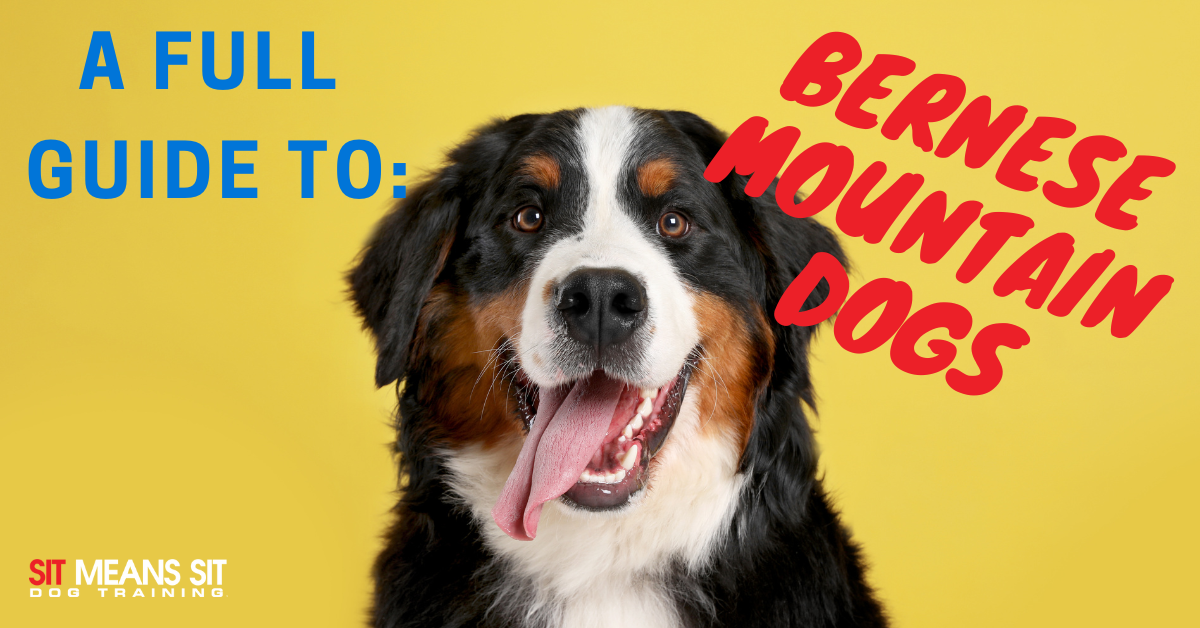
A Full Guide on Bernese Mountain Dogs
Bringing home a dog is a big step in a person’s life that requires a lot of careful consideration and planning. From researching temperament, dietary needs, and overall health of a breed, there is a lot a dog owner needs to know. Especially when bringing home a big dog like a Doberman.
Thinking about bringing home a Bernese Mountain Dog? Here’s what you need to know.
History
The Bernese Mountain Dog is a Mastiff breed of dog that originated in the Swiss Alps as a working dog. They were used to pull carts, accompany livestock, stand watch, and accompany their owners wherever they went.
By 1888, only 36% of the Swiss population was working in agriculture, so their need for such a strong dog dwindled and the population of the Bernese Mountain Dog began to decline. However, in 1899, the Swiss became interested in preserving this native breed and found the Berna dog club. Members of this dog club were made up of breeders of a variety of purebred dogs.
The first Bernese dogs were exported to the US after WWI and after their breeding slowed during WWII, the Bernese Mountain Dog Club of America was founded in 1968. They became recognized by the AKC in 1990.
Quick Facts
- Height: 23 to 28 inches tall at the shoulder
- Weight: 70 to 115 pounds
- Life Span: 6 to 10 years
- Breed Category: Working Dogs
- Shedding: Yes
Temperament and Personality
The Berner breed is extremely affectionate, intelligent, and alert. They are great family dogs as they are very gentle, calm, and tolerant. They are at their best when they are included in family activities.
Early training is very important with this dog. Their huge size can make strangers wary of being around them so it’s important for them to be trained on how to behave properly around new people and in your home. They reach their full adult size before they reach full mental maturity.
This breed is very protective of its family but generally is not aggressive. They tend to be aloof and shy with strangers so socialization is important for them.
Health
While Berners are generally a healthy breed, the most common health issues arise from irresponsible breeding practices. When choosing a Bernese breeder, make sure to do some research into their breeding practices.
The most common health issues to look out for include:
- Cancer: Bernese Mountain Dogs can be prone to multiple types of cancer.
- Hip Dysplasia: This occurs when the femur doesn’t fit properly into the hip joint. Dogs with hip dysplasia should not be bred. Ask your breeder if the parents have been screened.
- Gastric Torsion: Also known as bloat, this is a condition that affects large-chested dogs like the Bernese Mountain Dog and can be life-threatening. This occurs when the stomach is distended with either gas or air and then twists.
Care
Bernese Mountain Dogs are big dogs that need big spaces. They will not be suited to an apartment or a condo and instead would prefer a house with a large fenced-in yard. Since they are working dogs, they have an excess of energy so they will need at least 30 minutes of exercise such as walks, runs, or fetch, as well as yard play throughout the day.
This dog has a very thick coat that keeps them extremely well insulated. For this reason, the Berner is a natural fit for cold climates, and will love to play in the snow. They are acutally one of the top dog breeds who love snow! This also means that you need to keep a very watchful eye on your dog during the hot summer months. They can be easily prone to heat stroke. It is best to limit exercise to early mornings or nighttime to keep them cool and keep them in the cool air inside during the day.
Berners grow very quickly but their joints and bones won’t be fully developed unto they are two years old. It is best practice to not allow them to run, jump excessively, or pull heavy loads on hard surfaces like pavement.
Berners are shedders, especially in the spring and fall. Regular brushing several times a week will help manage the hair all over your house and a bath every three or so months will keep them looking and smelling fresh.
Brush their teeth at least a few times a week and trim their nails if you can hear them clicking when they walk.
Overall, the Bernese Mountain Dog is a wonderful addition to a family if you are prepared and know what to expect. If you would be more interested in adopting than shopping for a Berner, look into the Bernese Mountain Dog Club of America for more information.
